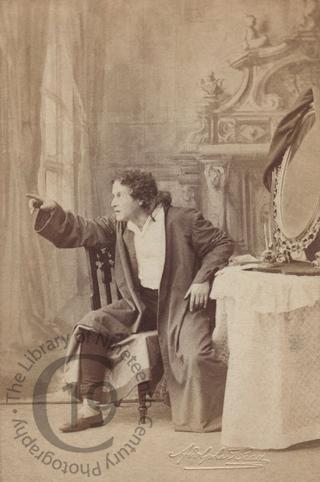
Alfred Wigan
A carte-de-visite portrait of the actor Alfred Wigan (1814-1878), who was also a playwright, a writer of farces and comedies, and a theatre manager. He was successively manager of the Olympic, the St James's Theatre and, lastly, the Queen's Theatre in Long Acre, which opened in 1867.
In 1841 he married the actress Leonora Pincott. As Mrs Alfred Wigan she appeared in comedies and farces at Drury Lane, the Lyceum, the Olympic and the Queen's Theatre. The Wigans retired in 1872.
Alfred Sidney Wigan 'formerly of Campden Hill Kensington but late of 33 Brompton-square both in the County of Middlesex' died on 29 November 1878 at Folkestone in Kent. He left an estate valued at £2000.
Towards the end of the century, the great criminal lawyer Montagu Williams published his memoirs; in Chapter VIII he reminisced about the London theatre scene of his youth. Of Charles Wigan he wrote: 'Wigan was one of the most accomplished men I ever met. He was a magnificent fencer and a masterly swordsman. He spoke French with the accent of a Parisian, he was tolerably well acquainted with every other modern language, and he was the most delightful and amusing of companions, being an excellent conversationalist and possessing one of the most pleasant and musical voices I have ever heard' (Leaves of a Life, 1890).
Photographed by Adolphe Beau of London.
According to the inscription in an album in the Royal Collection, he is seen here as Henri Desart in The Isle of St Tropez, a role he first played at the St James's Theatre in 1860.
'The new play produced at this theatre, under the title "The Isle of St Tropez," is a free adaptation of the well-known melodrama, "La Dame de St Tropez," which created a great sensation when performed a few years ago by Mr Mitchell's French company, with Mr Frederic Lemâitre [sic] in the leading character.' The plot concerns 'a man of bluff but genial and generous nature' with a large fortune, who believes he is being poisoned by his young wife, whom he still nevertheless adores. In the final scene he sits down to write an avowal that he has died by his own hand, in order to protect her, he believes, from the consequences of her actions, but at the last moment he spies in a mirror the real culprit, his steward, mixing poison into his draught. 'The truth now flashes across his failing sight, and he has just enough strength left to denounce the real murderer and to proclaim the innocence of his wife, into whose arms he sinks, a pallid corpse' (Morning Post, 22 December 1860).
Code: 127251




